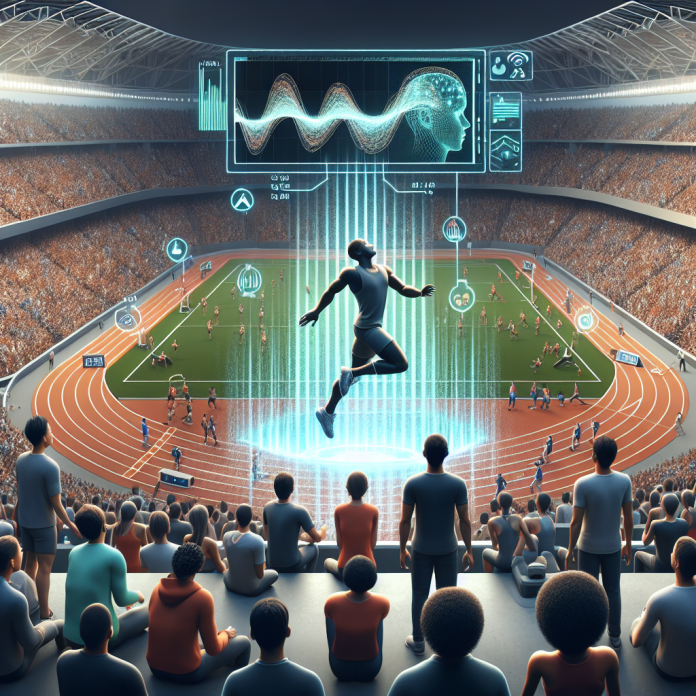Artificial Intelligence (AI) has been making waves in various industries, from healthcare to finance, but one area where it is rapidly gaining traction is in the sporting arena. Gone are the days when athletes relied solely on their natural abilities and instincts; now, with the help of AI technology, they can enhance their performance, optimize their training, and even prevent injuries.
### The Rise of AI in Sports
AI is revolutionizing the way sports teams analyze data, make strategic decisions, and improve player performance. With the help of machine learning algorithms, coaches and analysts can now sift through vast amounts of data, including player statistics, game footage, and even biometric information, to gain insights that were previously impossible to uncover.
One of the most significant impacts of AI in sports is in the realm of injury prevention. By analyzing players’ movement patterns and biomechanics, AI-powered systems can identify potential risk factors for injuries and provide personalized training programs to help athletes mitigate those risks. For example, wearable devices equipped with sensors can track an athlete’s movements during practice or games and alert them when they are at risk of overexertion or injury.
### AI in Training and Performance Optimization
AI is also being used to optimize training programs and improve player performance. By analyzing data on a player’s physical condition, skill level, and performance history, coaches can tailor training regimens to address specific weaknesses and improve overall performance. For example, AI-powered systems can analyze a soccer player’s shooting technique and provide real-time feedback on how to improve their accuracy and power.
In addition to individual player performance, AI is also revolutionizing the way teams strategize and make tactical decisions during games. By analyzing data on opponents’ playing styles, formations, and tendencies, coaches can develop more effective game plans and make real-time adjustments based on the latest data. This not only gives teams a competitive edge but also enhances the overall fan experience by providing deeper insights into the game.
### Real-Life Examples of AI in Sports
Numerous professional sports teams have already embraced AI technology to gain a competitive advantage. For example, the NBA’s Golden State Warriors have partnered with a company called Second Spectrum to analyze player movements and game footage using AI-powered algorithms. By leveraging this technology, the Warriors have been able to optimize their defensive strategies, improve player efficiency, and ultimately win games.
In soccer, clubs like FC Barcelona and Manchester City are using AI to analyze player performance and optimize training programs. By collecting data on players’ physical condition, tactical awareness, and technical skills, these teams can identify areas for improvement and tailor training sessions to address those weaknesses. This has not only helped them win championships but also attract top talent by showcasing their commitment to player development.
### Ethical Considerations and Challenges
While AI offers numerous benefits in the sporting arena, it also raises some ethical considerations and challenges. One of the main concerns is privacy and data security, as the collection and analysis of personal data, including biometric information, raise questions about transparency and consent. Athletes need to be aware of how their data is being used and protected to ensure their rights are respected.
Another challenge is the potential for bias in AI algorithms, as they can reflect and amplify existing inequalities and stereotypes. For example, if a machine learning algorithm is trained on biased data that favors certain types of players or playing styles, it may perpetuate those biases in its recommendations and decisions. Coaches and analysts need to be vigilant in ensuring that AI technologies are used responsibly and ethically.
### The Future of AI in Sports
As AI continues to evolve and become more sophisticated, its role in the sporting arena is only expected to grow. In the coming years, we can expect to see AI-powered systems become even more integrated into the daily operations of sports teams, from training and performance analysis to scouting and recruitment.
One exciting development is the use of AI in virtual reality (VR) and augmented reality (AR) training programs, which can simulate game scenarios and provide players with immersive training experiences. By combining AI with VR/AR technologies, teams can create highly realistic simulations that mimic game conditions and help players prepare for high-pressure situations.
Overall, AI has the potential to revolutionize the way sports are played, coached, and experienced. By harnessing the power of machine learning algorithms and data analytics, teams can gain a deeper understanding of their players’ performance, make more informed decisions, and ultimately achieve greater success on and off the field. As technology continues to advance, the possibilities for AI in the sporting arena are limitless, and the future looks brighter than ever before.

